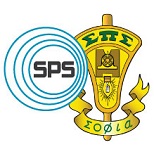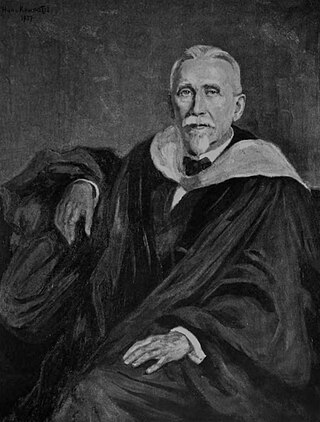
Leonard Bloomfield was an American linguist who led the development of structural linguistics in the United States during the 1930s and the 1940s. He is considered to be the father of American distributionalism. His influential textbook Language, published in 1933, presented a comprehensive description of American structural linguistics. He made significant contributions to Indo-European historical linguistics, the description of Austronesian languages, and description of languages of the Algonquian family.

The 72nd United States Congress was a meeting of the legislative branch of the United States federal government, consisting of the United States Senate and the United States House of Representatives. It met in Washington, D.C. from March 4, 1931, to March 4, 1933, during the last two years of Herbert Hoover's presidency. The apportionment of seats in this House of Representatives was based on the 1910 United States census. The Senate had a Republican majority. The House started with a very slim Republican majority, but by the time it first met in December 1931, the Democrats had gained a majority through special elections.
The American Association for the Advancement of Science (AAAS), founded in 1848, is the world's largest general scientific society. It serves 262 affiliated societies and academies of science and engineering, representing 10 million individuals worldwide. It is publisher of the journal Science, which has the largest paid circulation of any peer-reviewed general science journal in the world and an estimated total readership of 1 million. AAAS fulfills its mission to "advance science and serve society" through initiatives in science policy; international programs; science education; communication; and more. It is a non-profit organization, with membership open to everyone.

The Linguistic Society of America (LSA) is a learned society for the field of linguistics. Founded in New York City in 1924, the LSA works to promote the scientific study of language. The society publishes three scholarly journals: Language, the open access journal Semantics and Pragmatics, and the open access journal Phonological Data & Analysis. Its annual meetings, held every winter, foster discussion amongst its members through the presentation of peer-reviewed research, as well as conducting official business of the society. Since 1928, the LSA has offered training to linguists through courses held at its biennial Linguistic Institutes held in the summer. The LSA and its 3,600 members work to raise awareness of linguistic issues with the public and contribute to policy debates on issues including bilingual education and the preservation of endangered languages.

The 80th United States Congress was a meeting of the legislative branch of the United States federal government, composed of the United States Senate and the United States House of Representatives. It met in Washington, D.C. from January 3, 1947, to January 3, 1949, during the third and fourth years of Harry S. Truman's presidency. The apportionment of seats in this House of Representatives was based on the 1940 United States census.

The 69th United States Congress was a meeting of the legislative branch of the United States federal government, consisting of the United States Senate and the United States House of Representatives. It met in Washington, D.C. from March 4, 1925, to March 4, 1927, during the third and fourth years of Calvin Coolidge's presidency. The apportionment of seats in the House of Representatives was based on the 1910 United States census.

The 75th United States Congress was a meeting of the legislative branch of the United States federal government, composed of the United States Senate and the United States House of Representatives. It met in Washington, D.C., from January 3, 1937, to January 3, 1939, during the fifth and sixth years of Franklin D. Roosevelt's presidency.

Sigma Pi Sigma (ΣΠΣ), founded at Davidson College on December 11, 1921, is the oldest and only American honor society for physics and astronomy. It is an organization within the Society of Physics Students and the American Institute of Physics and a member of the Association of College Honor Societies. The society's stated goals are "to honor outstanding scholarship in physics and astronomy; to encourage interest in physics and astronomy among students at all levels; to promote an attitude of service of its members towards their fellow students, colleagues, and the public; to provide a fellowship of persons who have excelled in physics and astronomy." The society has some 90,000 historical members.

Hermann Collitz was a German and American historical linguist and Indo-Europeanist. He emigrated from Germany to the United States in 1886, taking a position at the newly founded Bryn Mawr College, where he stayed for 20 years. In 1907 he left for the Johns Hopkins University, where he taught until his retirement in 1927. His career interests covered the historical phonology and morphology of Indo-European languages. An advocate for American linguistics to his European colleagues, Collitz was among the 27 signers of the call to form the Linguistic Society of America, and was elected its first president. That same year he was elected president of the Modern Language Association, serving in both roles simultaneously.
Marianne Mithun is an American linguist specializing in American Indian languages and language typology. She is a professor of linguistics at the University of California, Santa Barbara, where she has held an academic position since 1986.
The California Republican Party (CAGOP) is the affiliate of the United States Republican Party in the U.S. state of California. The party is based in Sacramento and is led by chair Jessica Millan Patterson, the first Latina to lead the party.

The Vermont Senate is the upper house of the Vermont General Assembly, the state legislature of the U.S. state of Vermont. The senate consists of 30 members elected from multi-member districts. Each senator represents at least 20,300 citizens. Senators are elected to two-year terms and there is no limit to the number of terms that a senator may serve.
The Alabama Democratic Party is the affiliate of the Democratic Party in the state of Alabama. It is chaired by Randy Kelley.

The Arizona Democratic Party is the affiliate of the Democratic Party in the U.S. state of Arizona. Its headquarters are in Phoenix.

The 144th New York State Legislature, consisting of the New York State Senate and the New York State Assembly, met from January 5 to April 16, 1921, during the first year of Nathan L. Miller's governorship, in Albany.
Ellen F. Prince was an American linguist, known for her work in linguistic pragmatics.

Emma Adelaide Hahn was an American linguist and classicist who specialized in Latin grammar and Indo-European linguistics. She served as chair of the Hunter College Classics department for twenty-seven years and was the first woman to serve as president of the Linguistic Society of America.
Klara H. Collitz was a German-American linguist.

The Thirty-Eighth Wisconsin Legislature convened from January 12, 1887, to April 15, 1887, in regular session.











